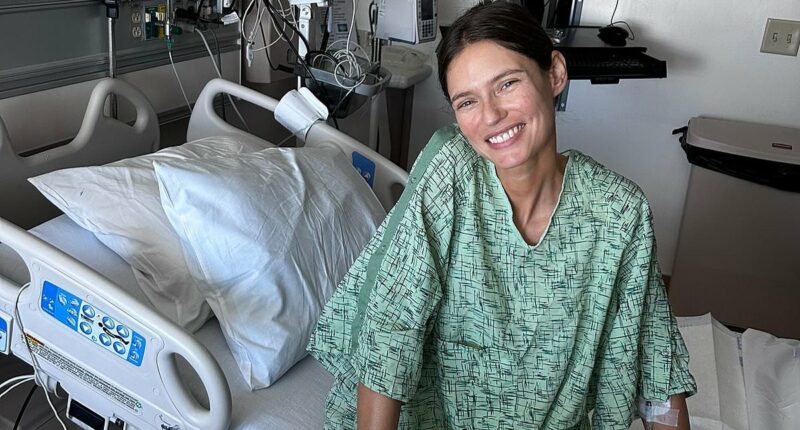Share this @internewscast.com
An oncologist has revealed the tell-tale signs of a ‘silent cancer’ she looks for in her own body.
Dr. Jamie Bakkum-Gamez, a gynecologic oncologist at the Mayo Clinic in Minnesota, explained that the early warning signs of ovarian cancer can be very subtle, often leading to misdiagnosis as they resemble less serious conditions.
And in just a few months, it can grow from microscopic to infiltrating multiple organs at a time.
This leads the disease, which affects 21,000 women in the US every year, to be dismissed and diagnosed at later, harder-to-treat stages.
In fact, more than half of cases are diagnosed after they have already spread from the ovaries.
Dr. Bakkum-Gamez herself faces risk factors; at 49 years old, she hasn’t given birth. After menopause, the ovaries cease production of protective hormones like estrogen and progesterone, potentially increasing cancer risk.
During pregnancy, ovulation does not occur. Ovulation involves the release of a mature egg from the ovary, causing inflammation at the ovary’s surface, which may damage DNA and eventually lead to tumor development.
Because she could be more prone to developing ovarian cancer, Dr Bakkum-Gamez is especially vigilant about the subtle warning signs.

Ovarian cancer often develops silently and causes vague, dismissed symptoms like abdominal pain and bloating (stock image)


Rachel Danchek from Pittsburgh experienced over a year of bloating and painful periods before being diagnosed with ovarian cancer in her early 30s. Bianca Balti, a Sports Illustrated model, was diagnosed with stage 3C ovarian cancer at 40.
She told TODAY.com: ‘Every single day, I care for people with ovarian cancer.
‘This is clearly something that hits home to me. … It’s definitely something that’s always on my mind personally.’
Ovarian cancer affects 21,000 US women every year and kills 12,700, according to the National Cancer Institute (NCI).
About 55 percent of ovarian cancers are considered ‘distant,’ meaning they have spread to other areas.
The cancer is diagnosed with a pelvic ultrasound or a blood test to measure tumor markers.
Generally, the five-year survival rate for ovarian cancer is 52 percent. More than 90 percent of women diagnosed at an early stage survive, but this rate drops to about 33 percent if the cancer spreads to nearby organs.
Women who are older, obese, have never had children or have a family history or genetic mutations are at the greatest risk.
When monitoring her own body, Dr Bakkum-Gamez takes quick notice of bloating, as this is one of the most common signs she sees in her own patients.
Dr. Bakkum-Gamez noted, “Patients often say, ‘I assumed I was just gaining weight due to eating habits,’ or ‘I didn’t understand why I was gaining this weight.'”
‘Usually, their abdomen is looking more along the lines of what you would look like if you were pregnant.’
Ovarian tumors cause fluid to build up inside the abdomen, a phenomenon called ascites, leading it to become hard and swollen. Left untreated, the fluid can become infected and lead to multi-organ failure.

The above graph shows the percent of ovarian cancer cases by stage at diagnosis. The majority of cases are found after the disease has already spread

The above graph shows the five-year survival rates for ovarian cancer based on stage
Dr Bakkum-Gamez said she when feels bloated, she checks to see if she has extra fat she can grip with her hands outside of the tough parts. If not, it could be a sign of fluid buildup.
Feeling full soon after eating, or early satiety, is another potential sign, as tumors or fluid accumulation can limit how much food the stomach can hold. It has also been linked to gastrointestinal conditions like gastroparesis and gastric obstructions, as well as stomach and colon cancers.

Dr Jamie Bakkum-Gamez, a gynecologic oncologist at the Mayo Clinic, is pictured above
Dr Bakkum-Gamez told TODAY.com: ‘If you’re hungry and you eat a small amount of food, and you feel full pretty fast … that should prompt someone to be evaluated.’
Additionally, a mass in the pelvic area can keep the bladder from filling up all the way and holding as much urine, so Dr Bakkum-Gamez suggests frequent urination is another potential red flag.
She noted ‘it’s not uncommon’ for patients with ovarian cancer to get up three or four times at night to use the bathroom, for instance.
And any bowel habit changes like sudden constipation or diarrhea should immediately be checked out, she advised.
These may occur because ovarian cancer can travel on the surface of the lining of the abdomen and pelvis, which also covers the intestines.
Ovarian cancer can also spread to the rectum, blocking normal bowel function.
Other signs of ovarian cancer include vaginal bleeding and abdominal or back pain.
Dr Bakkum-Gamez said any of these symptoms that extend beyond a week or two should immediately be evaluated.










